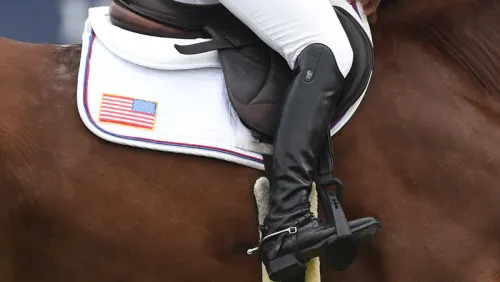After a video compilation showing dressage rider Cesar Parra whipping horses and severely disciplining them from the saddle and the ground was made public Feb. 1, the U.S. Equestrian Federation did not immediately suspend Parra because it did not have the power to do so. That would change if two proposed new rules—including one introduced today—are approved by USEF’s board at its mid-year meeting.
USEF’s existing rules only allow it to discipline riders for abuse occurring in conjunction with a competition—either on show grounds or when a horse is presented for competition with evidence of recent abuse—or in response to action taken by “certain other entities such as the authorities or a court of law,” USEF spokeswoman Vicki Lowell said in an email.
Today, however, the USEF officers released a proposed extraordinary rule change to GR838.1 that would strengthen the definition of abuse, expand the scope of the USEF’s jurisdiction over abuse to include abuse that happens away from competitions, require that members report abuse to a licensed official at a competition or the USEF if not, and clarify that a licensed official or competition management can take swift action when abuse occurs at a competition.
“Social license is a vitally important issue for our industry, and further oversight of training practices outside of competition has been an important topic under consideration,” Lowell wrote. “The Cesar Parra concerns are an example of why this is an important issue to address. The rule change is being released today to provide as much time as possible for member and stakeholder feedback.”
Although the rule change, if approved at the mid-year board meeting to go into effect Dec. 1, 2024, cannot be applied retroactively, it would ensure that “a person who abuses a horse any time after the effective date of the rule change can be accountable under USEF’s rules, regardless of where the abuse occurred,” stated the first version of the proposed rule change.
Extraordinary rule changes are vetted by USEF committees but bypass the traditional rule change process. The mid-year meeting will take place June 17-18.
USEF first posted the rule change at noon Eastern time today, then later replaced that document with an updated version.
“USEF takes its social license to operate very seriously and learning from the mistakes of others, recognizes that time is of the essence,” the proposal states, addressing the intent behind its introduction. “The social license under which equestrian sport operates requires that horses be treated as athletic partners and receive appropriate training as required by all athletes. In competing and preparing for competition, horse welfare must be paramount at all times.”
ADVERTISEMENT
The extraordinary rule change defines abuse as “any action or omission that causes or is likely to cause pain or unnecessary discomfort to a horse,” listing 21 examples of abuse. While most of the examples are listed in the current definition of abuse (see GR838), the proposal adds some notable new ones, including excessive longeing of a horse and excessive competing of a horse.
Members may comment on the proposed extraordinary rule change proposal here (scroll down to “currently active non-standard proposed rule changes” to tracking No. 109-23).
In addition to the extraordinary rule, there’s a standard rule change proposal to GR 702 that would give the USEF the power to sanction a member for “Physical assault upon a person and/or cruelty and abuse to a horse as defined in GR838, whether such conduct occurred at a licensed competition or at any other time.” (The proposed change to language is noted in boldface.)
That proposal received mixed reviews when discussed at the U.S. Hunter Jumper Association’s annual meeting, with some fearing the rule was an overreach or could be abused as a form of retaliation. But ultimately concerns over how bad behavior at home could influence the sport’s social license to operate prevailed, and the USHJA board of directors approved the rule, which will be voted on by the USEF board of directors at the June mid-year meeting.
Despite Olympic individual gold medalist and USEF Chief of Sport David O’Connor’s championing the rule change proposal at the U.S. Eventing Association, it failed to pass at the final board meeting in a 3-8 vote. The proposal was read but not discussed in open meetings at the U.S. Dressage Federation annual meeting, and the USDF board voted in support of the rule change proposal.
Without one of these rules in place, USEF isn’t able to sanction riders for abuse that happens outside of the show context, so wasn’t able to sanction Parra after the videos surfaced showing abuse off show grounds. But the FEI’s stronger rule (see Article 142—abuse of horses) allows the international organization to sanction members for abuse “during an event or at any other time.” It provisionally suspended Parra on Feb. 2, and because USEF honors FEI suspensions, Parra then was banned from competing nationally in USEF-recognized competitions as well.
The FEI and USEF are continuing their investigations into Parra, and an FEI spokesperson said the organization could open disciplinary proceedings against the rider based on the results of that investigation.














